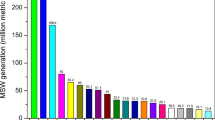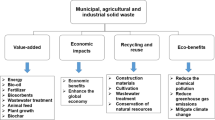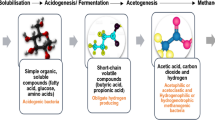Abstract
Population growth, waste generation, and massive waste mismanagement have led to environmental catastrophe. Management of municipal solid waste (MSW) requires an efficient and sustainable integrated system. The integrated thermal processing of MSW is one of the best waste management techniques. In this study, energy analysis of MSW is carried out based on the material and energy balance of 2000 kg wet MSW, which contains 50% leachate. Once the leachate is removed, the dry MSW is sent for carbon content enhancement in carbonization to produce MSW-based char. Thereafter, the combustion of MSW-based char provided high heat and syngas to be used in a hydrothermal process for MSW leachate treatment. The result shows that the char fuel of MSW produces a sufficient amount of energy, 13501.29 MJ (84.55%), in the form of synthetic gas by-product, which has a big potential as an energy source. The novelty of the proposed integrated thermal system is to produce 84.55% synthetic gas by-product, which is used for electricity production, cooking, food, and heat energy for industrial purposes. The proposed applications of this paper offer insightful information for policymaking regarding novel MSW techniques, which are economical, energy-efficient, and environmentally friendly. Thus, it increases the effectiveness of MSW utilization.
Graphical abstract




Similar content being viewed by others
References
Silpa, K., Yao. L.C., Bhada-Tata Perinaz V.W.F. 2018. What a Waste 2.0 : A Global Snapshot of Solid Waste Management to 2050. Urban Development. Washington, DC: World Bank.
Ferronato, N., and Torretta, V. 2019. Waste mismanagement in developing countries: A review of global issues. International Journal of Environment Research and Public Health 16 (6): 1060.
Das, A.K., Islam, M.N., and Billah, M.M. 2021. COVID-19 and municipal solid waste (MSW) management: a review. Environmental Science Pollution Research 28: 28993–29008. https://doi.org/10.1007/s11356-021-13914-6.
Agamuthu, P., and Barasarathi, J. 2021. Clinical waste management under COVID-19 scenario in Malaysia. Waste Managment Research 39: 18–26. https://doi.org/10.1177/0734242X20959701.
Carvalhais, C., Querido, M., Pereira, C.C., et al. 2021. Biological risk assessment: a challenge for occupational safety and health practitioners during the COVID-19 (SARS-CoV-2) pandemic. Work 69: 3–13. https://doi.org/10.3233/WOR-205302.
Ravindra, K., Kaur, K., and Mor, S. 2015. System analysis of municipal solid waste management in Chandigarh and minimization practices for cleaner emissions. Journal of Clean Production 89: 251–256. https://doi.org/10.1016/j.jclepro.2014.10.036.
Ogwueleka, T.C. 2009. Municipal solid waste characteristics and management in Nigeria. Iran Journal of Environmental Health Science and Engineering 6 (3): 173–180.
Visvanathan, C., Trankler, J. 2006. Municipal Solid Waste Management in Asia: A Comparative Analysis. In: Proceeding of the Seminar on Solid Waste Landfill Technology in Asia, 3–4 August 2006, Kasetsart University, Bangkok, pp. 1–14. https://doi.org/10.18517/ijaseit.2.2.169
Peter, A.E., Shiva Nagendra, S.M., and Nambi, I.M. 2019. Environmental burden by an open dumpsite in urban India. Waste Management 85: 151–163. https://doi.org/10.1016/j.wasman.2018.12.022.
Abd Kadir, S.A.S., Yin, C.Y., Rosli Sulaiman, M., et al. 2013. Incineration of municipal solid waste in Malaysia: Salient issues, policies and waste-to-energy initiatives. Renewable and Sustainable Energy Reviews 24: 181–186. https://doi.org/10.1016/j.rser.2013.03.041.
Isa, K.M. 2017. Characterization, calculation of calorific values, and bio-oil production via thermochemical processes of municipal solid waste in Perlis, Malaysia. Malaysian Journal of Analytical Science 21: 801–809. https://doi.org/10.17576/mjas-2017-2104-06.
Komilis, D., Kissas, K., and Symeonidis, A. 2014. Effect of organic matter and moisture on the calorific value of solid wastes: An update of the Tanner diagram. Waste Management 34: 249–255. https://doi.org/10.1016/j.wasman.2013.09.023.
Mohammed, M., Ozbay, I., and Durmusoglu, E. 2017. Bio-drying of green waste with high moisture content. Process Safty Environment Protection 111: 420–427. https://doi.org/10.1016/j.psep.2017.08.002.
Hacifazlioglu, H. 2020. Production of merchantable coal from low rank lignite coal by using FGX and subsequent IR drying. International Journal of Coal Preparation and Utilization 40: 418–425. https://doi.org/10.1080/19392699.2018.1450248.
Kokalj, F., Samec, N. 2013. Combustion of municipal solid waste for power production. Chapter 9, In Advances in Internal Combustion Engines and Fuel Technologies, Ng, H. K. (ed.), London, UK: IntechOpen.
Walter, R.N. 1995. Combustion and Incineration Processes: Applications in Environmental Engineering, 2nd ed. New York, NY, USA: Marcel Dekker Inc.
Ouda, O.K.M., Raza, S.A., Nizami, A.S., et al. 2016. Waste to energy potential: A case study of Saudi Arabia. Renewable and Sustainable Energy Reviews 61: 328–340.
Pan, S.Y., Du, M.A., Huang, I.-T., et al. 2015. Strategies on implementation of waste-to-energy (WTE) supply chain for circular economy system: a review. Journal of Clean Production 108: 409–421.
Siddiqi, A., Haraguchi, M., and Narayanamurti, V. 2020. Urban waste to energy recovery assessment simulations for developing countries. World Development 131: 104949. https://doi.org/10.1016/j.worlddev.2020.104949.
Ghosh, A., Sarkar, J. P., and Das, B. 2019. Sustainable Energy Recovery from Municipal Solid Waste (MSW) using Bio-reactor Landfills for Smart City Development. In 2019 IEEE International Conference on Sustainable Energy Technologies (ICSET). https://doi.org/10.1109/icsets.2019.8745334.
Cheela, V., John, M., Biswas, W., et al. 2021. Environmental Impact Evaluation of Current Municipal Solid Waste Treatments in India Using Life Cycle Assessment. Energies 14 (11): 3133. https://doi.org/10.3390/en14113133.
Iqbal, A., Zan, F., Liu, X., et al. 2019. Integrated municipal solid waste management scheme of Hong Kong: A comprehensive analysis in terms of global warming potential and energy use. Journal of Cleaner Production 225: 1079–1088. https://doi.org/10.1016/j.jclepro.2019.04.034.
Varjani, S., Shahbeig, H., Popat, K., et al. 2022. Sustainable management of municipal solid waste through waste-to-energy technologies. Bioresource Technology 355: 127247.
Upadhyay, A., Singh, R., Talwar, P., et al. 2023. Insights into sustainable resource and energy recovery from leachate towards emission mitigation for environmental management: A critical approach. Journal of Environmental Management 343: 118219. https://doi.org/10.1016/j.jenvman.2023.118219.
Sandip, T.M., Khare, K.C., and Biradar, A.H. 2012. Bioresource Technology Enhancement of methane production and biostabilisation of municipal solid waste in anaerobic bioreactor landfill. Bioresource Technology 110: 10–17.
Patil, B.S., Anto, C.A., and Singh, D.N. 2016. Simulation of municipal solid waste degradation in aerobic and anaerobic bioreactor landfills. Waste Management & Research 35 (3): 301–312.
Speier, C.J., Mondal, M.M., and Weichgrebe, D. 2018. Evaluation of compositional characteristics of organic waste shares in municipal solid waste in fast-growing metropolitan cities of India. Journal of Material Cycles and Waste Management 20: 2150–2162. https://doi.org/10.1007/s10163-018-0757-y.
Saxena, S.C., and Jotshi, C.K. 1996. Management and combustion of hazardous wastes. Progress in Energy Combustion Science 22: 401–425. https://doi.org/10.1016/S0360-1285(96)00007-X.
Yunus M.N.M. 2006. The development of municipal solid waste treatment technology based on refuse derived fuel and bio-gasification integration. In International Symposium on Renewable Energy: Environment Protection and Energy Solution, pp. 79–92.
Yazie, T.D., Tebeje, M.G., and Chufa, K.A. 2019. Healthcare waste management current status and potential challenges in Ethiopia: A systematic review. BMC Research Notes 12: 285. https://doi.org/10.1186/s13104-019-4316-y.
Asokan, P., Saxena, M., and Asolekar, S.R. 2010. Recycling hazardous jarosite waste using coal combustion residues. Mater Characteristics 61: 1342–1355. https://doi.org/10.1016/j.matchar.2010.09.005.
Performance Management and Delivery Unit (PEMANDU). 2015. Solid Waste Management Lab 2015. Presint, Malaysia: Kementerian Perumahan dan Kajian Tempatan (KPKT), 1–432.
Tan, S.T., Hashim, H., Lim, J.S., et al. 2014. Energy and emissions benefits of renewable energy derived from municipal solid waste: Analysis of a low carbon scenario in Malaysia. Applied Energy 136: 797–804.
Acknowledgements
This work was supported by the Ministry of Higher Education of Malaysia through Fundamental Research Grant Scheme (No. FRGS/1/2019/TK10/UIAM/02/2).
Author information
Authors and Affiliations
Corresponding authors
Ethics declarations
Conflict of interest
The authors declare that there is no conflict of interest.
Additional information
Publisher's Note
Springer Nature remains neutral with regard to jurisdictional claims in published maps and institutional affiliations.
Rights and permissions
Springer Nature or its licensor (e.g. a society or other partner) holds exclusive rights to this article under a publishing agreement with the author(s) or other rightsholder(s); author self-archiving of the accepted manuscript version of this article is solely governed by the terms of such publishing agreement and applicable law.
About this article
Cite this article
Khamis, S.S., Purwanto, H., Salleh, H.M. et al. Novel energy recovery from an integrated municipal solid waste and leachate treatment system. Waste Dispos. Sustain. Energy 6, 53–61 (2024). https://doi.org/10.1007/s42768-023-00177-9
Received:
Revised:
Accepted:
Published:
Issue Date:
DOI: https://doi.org/10.1007/s42768-023-00177-9




